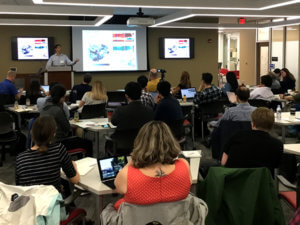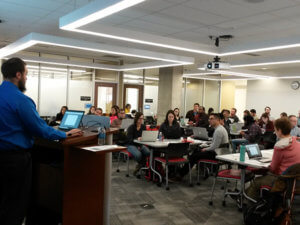OSU Research Commons
Programming established in 2014
Research Commons opened in 2016
https://library.osu.edu/researchcommons/
Staff: 5 library faculty and 3 staff
Campus Partners: https://library.osu.edu/researchcommons/about/partners/
Overview

The Ohio State University (OSU) Libraries Research Commons is a busy, service-based facility located in the 18th Avenue Library that supports researchers throughout the research life cycle by offering workshops, topical presentations, referrals to other experts, and consultations. The Research Commons is both a physical space and a service network, acting as a hub for research support to researchers at various levels—faculty, graduate students, postdocs, research staff, and undergraduates—and providing strong referrals to expertise throughout the university. The main areas of research support focus on finding, managing, and visualizing data; GIS and mapping; digital humanities methods and tools; measuring research impact; and research funding requirements, copyright, authors’ rights, and publishing.
Before the facility opened in January 2016 under the auspices of the OSU Libraries operating fund, library faculty provided workshops around campus branded as the Research Commons. In keeping with the vision and mission of the emerging facility, these workshops were often organized in partnership with other researcher-facing units on campus. Early partners included the Writing Center, the Office of Research, the Office of Responsible Research Practices, the Supercomputer Center, and the Center for Urban and Regional Analysis—all of which are among the Research Commons’s 18 external partners today.
Meris Mandernach Longmeier, head of Research Services, shared with ARL the vision and goals for the Research Commons: OSU researchers will recognize the libraries as a valuable contributor to their research success, actively engage with library spaces and support resources to advance their work, and partner in showcasing and disseminating their research.
Staffing and Services

The Research Services department is composed of five full-time library faculty—the head of Research Services, a data services librarian (search forthcoming), a research impact librarian, a geospatial services librarian, and a digital humanities librarian; and three library staff—a Research Commons concierge/student supervisor, a data visualization specialist, and a data services specialist (currently vacant). The libraries’ head of Research Services, to whom all staff report, provides vision and direction. Research Commons staff also draw upon the services of affiliated library services, such IT infrastructure for hardware and software support. Additionally, Research Commons faculty and staff partner with other library departments, including Copyright Services, Subject Librarians, and Publishing and Repository Services, to offer centralized support through the Research Commons facilities.
The Research Commons is primarily designed to support the research endeavors of faculty and graduate students, provide a venue for them to highlight their research products, and to improve their abilities to measure their research impact and manage their online identities. Some research groups meet regularly in the commons to make use of its visualization capabilities. Undergraduates, while not an active target market, are welcome to attend any open workshop or research presentation event or make use of spaces if they are involved in a research project. Education and training offerings include instruction on a wide variety of digital scholarship methods with an emphasis on open source tools, including text analysis, data visualization basics, introduction to geospatial analysis, basics of human subject research, and managing a digital scholarship project. Research Commons faculty and staff also offer classroom visits for specific tools or methodologies upon request, as well as professional development opportunities for library staff to learn new tools and/or methods employed in digital scholarship.
The Research Commons partners also offer a variety of workshops on research funding, including finding intramural and extramural grant opportunities, navigating institutional review board (IRB) requirements, and meeting funder requirements for data management. OSU is intentionally focused on outreach to humanities and social sciences disciplines, having identified a gap in research support on campus for these communities. People from STEM fields, however, tend to attend Research Commons events in equal measure, and interdisciplinary research is on the rise at OSU, where it is encouraged and supported by research administration and for which funding is available from the university and external sources.
The Research Commons partners with other OSU research services units, such as Discovery Themes, a university-wide, interdisciplinary research institute; the Proposal Development Office, which matches donors with specific research initiatives on campus; and the Industry Liaison Office, which connects corporations with university-based research personnel and activities. All of these units regularly make use of space and hold events in the Research Commons. The space has become so popular for meetings and presentations, in fact, that it’s a challenge for faculty and staff to maintain the premium quiet study space in the Research Commons upon which graduate students have come to rely.
Projects

The Research Services department is made up of library faculty and staff with specific disciplinary expertise in the areas of data management, digital humanities, geospatial information services, data visualization, and research impact. In the course of the evolution of the service model, many of these faculty and staff have been developing collaborative projects with campus researchers. For example, the geospatial services librarian has assisted many researchers in individual consultations that grew into collaborative projects resulting in co-authorship. Often the partnership grows along the workshop-to-consultation-to-collaboration pipeline. The faculty and staff are piloting a work agreement that would be filled out when a collaborative project is undertaken so that everyone involved with the project would understand the scope of work, timeline, deliverables, and expectations.
Partnerships and Success
Since many units within OSU offer support for research projects, faculty and staff in the Research Services department spend a lot of time making referrals to other areas of campus. The digital humanities librarian often fills the role of translator on collaborative project teams working with developers and designers from other units on campus.
One of the greatest achievements of the Research Commons has been its extensive partnership network across campus and the extent to which the Research Commons is well known, promoted, and integrated into service offerings of these partner units, and well used by them as a space for meetings, events, and presentations for the campus community.
While high demand and utilization are powerful metrics, the Research Commons has developed a logic model that will be used to determine its longer-term success in meeting its goal of being a valuable research contributor and interdisciplinary incubator. The first round of analysis from the logic model is currently underway.
Judy Ruttenberg | 202-296-2296 | judy@arl.org | August 6, 2019


